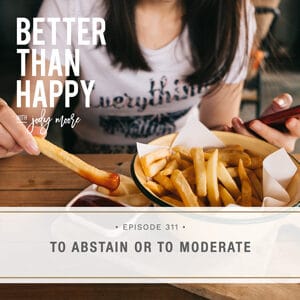Podcast: Play in new window | Download

When it comes to certain aspects of our lives, there are things that we enjoy, and they’re okay in moderation, but they become problematic for us in excess. However, our brains resist this idea. When something tastes good, our brain wants more and more, and it doesn’t care about how unhealthy it is, the cost, or any of that stuff. It just wants it.
Food is an obvious example, but our brains working in this way create habits in so many areas of our lives: shopping, social media, you name it. And if we don’t take the time to look at what’s going on, we can end up in trouble. So, what’s the solution? Would it be better to abstain or to moderate in these areas? Well, if you’re struggling with this decision, you’re in the right place.
Tune in this week as I discuss the idea of abstinence versus moderation, and I’m basing this conversation around an idea that I learned from the author Gretchen Rubin. I’m discussing the pros and cons of both abstinence and moderation, and how you can decide which one is the best approach for you.
If you don’t currently have a life coach, I would be so honored to be yours. I created a virtual coaching program called Be Bold that I want to invite you to join me in. We have group coaching, individual private coaching, and online chats along with hundreds of hours of courses and content that I’ve created just for you. If you’re ready to take this work to the 10X level, click here to check it out!
Towards the end of this summer, I will be launching my business coaching program, Business Minded. To get on the interest list for when the doors open, click here.
What You’ll Learn on this Episode:
- How our primitive brain processes those things that feel amazing in the moment, but aren’t good for us in excess.
- Why people who abstain will always tell you abstaining is the solution and the arguments that people who have mastered moderation will give you.
- The importance of not indulging in shame around overindulging.
- Why neither abstinence nor moderation is going to be the perfect solution for everyone.
- How I view this in my own life, and how to decide what the best approach is for you.
Mentioned on the Show:
- When you’re ready to take what you’re learning on the podcast to the 10X level, then come check out Be Bold.
- If you’re a coach who is already certified through The Life Coach School, I want to help you take your coaching to the next level. Interested? Get on the waitlist here.
- Follow me on Instagram!
- Grab the Podcast Roadmap!
- Gretchen Rubin: Website | Happier Podcast
- The Happiness Project by Gretchen Rubin
- The Four Tendencies by Gretchen Rubin
I’m Jody Moore and this is Better Than Happy, episode 311: To Abstain or To Moderate.
Did you know that you can live a life that’s even better than happy? My name is Jody Moore. I’m a master certified life coach and a member of the Church of Jesus Christ of Latter Day Saints. And if you’re willing to go with me I can show you how. Let’s go.
Hey there gang. How’s it going? Welcome to our regular Friday episode. Lots of bonus episodes coming out this summer as I’m talking about business on Tuesdays. So, if it’s confusing just go ahead and follow the podcast which is what used to be subscribing to the podcast, now called following the podcast at least on Apple products, iTunes, iPhones. And then every time one comes out you’ll just get it show up right in your podcast feed, pretty nice, pretty convenient.
Thank you to all of you tuning in. Thank you for those of you sharing. Thank you for the reviews that you’re leaving. I love hearing what you like. I like hearing what you don’t like too so I can modify the podcast to be more of what you want.
I want to put a callout for questions because I’m getting ready to do a Q&A episode. And so, if you have a question that you want to ask me, you want me to answer, I will keep it anonymous. I will not share your name. But please just go ahead and send me a direct message on Instagram. My Instagram handle is Jody Moore Coaching if you’re not following me there, you can find me. And just shoot me over your question via DM and we will be doing a Q&A episode pretty soon.
Today I want to talk about the idea of abstinence versus moderation. And I’m going to be basing this around a concept that I learned from Gretchen Rubin. So, Gretchen Rubin is an author. She wrote books such as The Happiness Project and The Four Tendencies. And she has a podcast called Happier and she’s somebody that I love to learn from. And she first presented the concept in this way.
And when I heard her teach it in this way I went, “Yes. That sounds right to me.” You know that feeling where you’re just like yes, I think that’s the way that I choose to think about this topic? And so, I’m just offering it to you for consideration.
So, when it comes to various things in our lives there are a lot of things that are maybe good in moderation and then can become not good for us in excess. The problem is our brains don’t really like good things in moderation. When something is ‘good’ meaning it feels good, it tastes good, it provides relief, or it gives us a hit of dopamine, or some other kind of hormone or chemical that our brain associates with survival. Then our brain says, “More, more, more.”
So, we all go through life and sometimes develop habits that then actually create problems for us. I mean food is just the most obvious example, so I’ll use it as the example to teach this. But you can apply this to social media, to shopping, to all kinds of things. A little bit of food is good for us. We need it to survive. We need food. Our bodies need it. Too much food actually can limit our chances at surviving longer. Too much food creates problems for us health wise even. So, food is a really obvious example.
Now, as we eat food, especially really concentrated foods like sugar, the brain becomes confused. The brain’s like, “What was that?” Have you guys seen Sweet Tooth by the way? My family and I are watching this show on Netflix called Sweet Tooth. It’s really cute. My kids like it. The little kid is raised in the wilderness by his dad and so he doesn’t ever try sugar until he’s about 10 years old and he loves it of course so he gets nicknamed Sweet Tooth. That’s what it’s like. Your brain’s like, “What was that? That was awesome. We should get more of that.”
And so, it becomes challenging then to manage ourselves around things like that because you have to override your primitive brain. It doesn’t think about the long term. It doesn’t listen to the rational, logical, higher prefrontal cortex part of your brain that says, “No, too much sugar will actually create health problems and could kill us.” We don’t want too much sugar. The brain’s just like, “I think you’re wrong. I think that more of that will make us live forever.”
So, then we get the question of okay, so should we just cut out sugar altogether? Should we never eat sugar? Or should we have sugar in moderation? And again, I’m just using sugar as the example. It doesn’t have to be sugar, could be all kinds of food. It could be Instagram. Shall we just all stop being on Facebook and Instagram? Shall we all delete our accounts? Because too much social media is not good for us. It’s really not. There’s lots of studies that show this nowadays.
Spending too much time mindlessly scrolling is actually linked to depression and anxiety and a lot of other problems. Spending money, we need to spend money. We need to buy things. That’s what money’s for. We pay for things that we want and need to help us live a better life, or survive, or have the things that we desire.
But if we overspend, if we get addicted to that little dopamine high that we get when we purchase something that’s coming in the mail and we just keep buying, buying, buying then we create problems. We have too much clutter. We might create financial problems for ourselves. We might not have the money that we want to have for other things.
So, do we just stop spending? You hear people do this. They’re like, “I went on a 30 days no spending period.” And I can’t imagine not needing to at least pay some bills or buy food. But maybe there are parameters. Maybe we don’t buy clothes at all for 30 days, 60 days, a year, whatever it is. Do we do that or do we just moderate it? Do we say, “I can spend a little bit on ‘frivolous’ things that I don’t really need but I’m not going to overspend?”
So, here’s the thing. People who are abstainers will make a case for abstaining. This is the way Gretchen Rubin taught it to me that made a lot of sense. People who abstain who say, “Hey, I used to eat sugar and now I don’t eat sugar ever. And it’s so much better. It’s so much easier because I don’t have to negotiate with myself to figure out whether or not I’m going to eat sugar. I just know it’s a no. Once I got over anyway the really difficult phase where my brain wanted it and had a tantrum, and I rewired my brain, I taught myself not to want it then my life is so much easier and better.”
I think I’ve even taught that in past years in my podcast as I’ve tried to figure out what I was going to do with food. That’s what abstainers will tell you, “It’s easier if you don’t eat it at all.” I can relate to this with alcohol because I’ve never been a drinker. So, I see people who drink alcohol and they’re trying to quit but they want to negotiate and have just a little bit of alcohol. And I’m like, “Well, if you just don’t drink it at all you just never think about it. You don’t ever buy it. You don’t really miss it. It’s just not part of your life.”
It’s so much easier that I never think about alcohol because I never have. So, there’s the abstainer camp. Then there’s the moderation camp that says, “Listen, if you just try to cut all sugar out of your life when you’ve been eating sugar.” Or you try to cut out social media altogether, or you tell yourself you can never buy something frivolous and fun then you’re going to create depravation. You’re going to restrict and therefore the desire is going to grow even stronger. You’re going to at some point most likely give in to that desire and that depravation.
And I don’t know about you but I can certainly relate to that. I’m like, “Yeah, done that many times.” Just told myself, “No, never, we’re not doing this thing.” And fought against it and it ultimately at some point could not fight against my primitive brain anymore. And then went even overboard on indulging in it. I can relate to this as food. I can relate to it with shopping. I can relate to it in a lot of ways.
So, moderators say, “Listen, just moderate, just have a moderate amount. Allow yourself a little bit. Allow yourself to have it or indulge in it if it’s not something that a little bit is going to be harmful.” There are certain things that even a little bit might be harmful. But I’m talking about food. I’m talking about social media. I’m talking about a little bit of spending. Talking about things that we would all say in moderation that’s probably fine, maybe even adds to your overall quality and enjoyment of life.
“So just allow yourself a little bit. It’s so much easier if you just allow yourself a little bit”, moderators will say. Because then you don’t build up a bunch of resistance around it. You don’t build up this depravation and you don’t have to then figure out what to do with that or give in to it. Just moderate. You guys have heard both sides of the coin. You’re living in the same world I have. I can make a very solid case for either side with any topic. You give me a topic; I should have been on the debate team because I’m pretty good at this.
You give me a topic like social media and I can make a case for abstaining and I can make a case for moderating, a solid case. I can believe it either way. I can see the argument either way when people bring it up. So, you know what Gretchen Ruben says? “You get to decide.” This is my favorite part of what she teaches. You just have to decide. You have to decide, are you an abstainer or are you a moderator? Which one is easier for you?
Is it easier for you to just cut it out altogether and get through the discomfort and get over it? Or is it easier for you to just allow a little bit in moderation and not build up a huge resistance and depravation around it? Now, this is the other thing I love that she teaches. You might not be the same thing in every area of your life. And even if we take an area, let’s take a topic like food.
There might be certain foods that you can moderate for yourself and just have in moderation. And doing so provides a little bit of joy, helps you live your life the way you want to, allows you to experience the world. And a little bit of it, fine. Probably a little bit of any food is totally not going to harm you in the long run. And then there may be other foods, if you have a little bit it lights a fire within you and you become out of control and then you’re just not going to be able to moderate.
And so maybe abstaining from that particular food will be the easiest way to achieve your nutrition and health goals. For me, this food is something that my daughter recently brought home. There are these things called popped corners I think is what they’re called. And they have a kettle corn flavor one and it’s like a light popped chip kind of, sort of like a really thin rice cake almost. But then they’ve flavored it kettle corn, so it’s just a little salty and just a little sweet and it’s really light and crunchy and I can’t really moderate myself with those things.
If I open up a bag I know I’m going to probably want to eat the whole bag, at least depending on the size of the bag, maybe half the bag. But more than my body really can tolerate and I can feel good and healthy, and not feel sluggish all day. So maybe I need to abstain from popped corners. I don’t know. There are other foods that I can moderate myself around. I’m really good with French fries.
I get my kids French fries and I eat usually three or four of their fries and I’m good, it satisfies my craving, gives me a little bit of salty, a little bit of fat. I don’t need to eat the whole bucket of fries, it’s fine. It’s easier for me to moderate and have a few fries than to go, “We’re not having fries at all.” Then I’ll just start thinking about French fries all the time. So, guess what? Should you abstain from those things that are challenging for you or should you just moderate how much of them you have, should you?
Now, I do think an important part of moderating is making the decision in advance, it’s deciding ahead of time, ideally the day before. Tomorrow I’m going to have a treat. Maybe this is the amount of it. And ideally maybe you would know what it was and when you were going to eat it. I think that’s powerful to do. But I don’t always do it that way. Sometimes I allow myself a little bit in the moment, even if I hadn’t planned it, even though I didn’t – maybe I didn’t know there was going to be treat there and I allow myself just a little.
Sometimes I’ve set overall general rules. I’m allowed to have a treat any time I want to. I’m just allowed to only have half of it. And when I say allowed, I mean that’s what I’m choosing to do in advance. So, you can set it up however you want.
I had a client I coached on this once who said, “She’s trying to achieve some health goals and sometimes her husband will bring home doughnuts.” She’s like, “I try not to eat it then I just get out of control and I eat three.” I told her, “I’m right there with you girl. I love a doughnut.”
But what if you just told yourself that you can have a treat whenever you want it? You can just only have one. But you can have one treat. Any time your husband brings something home you have one. And for her that was going to be a lot easier than telling herself not to have it. Now, here’s the other thing to keep in mind. You can change your mind. You’re totally allowed to change your mind. I have.
Like I said, I know I’ve done podcast episodes some time in years past where I’m like, “Let’s just not eat flour or sugar.” And I still can see the case for that. I just found that it was really hard for me to do and that I just thought about flour and sugar all the time and then I ate way more of it. So maybe one day, maybe one day I’ll get to the point where I’ll abstain from it. Right now, I moderate. It’s just easier for me. I want you to do the thing that’s easier for you, you guys, abstain or moderate, which one’s going to be easier?
Now, abstaining from alcohol, easy for me because I never got my brain wired to crave it. But abstaining from flour and sugar, not easy, so I moderate. So, you get to decide. Now, listen, people that have really strong opinions one way or the other don’t be mad at them, they mean well. They’re just trying to help you. We’ve all been them probably in some area. And what I think is the most important is that you learn to pay attention to you. You learn to pay attention to yourself. Don’t hide from yourself.
As soon as you’re ashamed of your behavior and this is true whether we’re talking about food, and social media, and shopping, or pornography, or drugs, or gambling, or lying. As soon as you become ashamed of your behavior then you’re going to want to hide from it. You’re going to lose awareness to yourself.
So, you have to be willing to get to know yourself. You have to be curious about what’s going on for you. And that is how you’ll be able to make decisions about whether you want to abstain or moderate from whatever it is you’re indulging in that maybe ultimately isn’t serving you. And it’s not a forever decision. It might mean that you’re going to begin with moderating and eventually get to abstaining. Alright, that’s fine. It might mean that you’re choosing to abstain for a while but then you’re going to change your mind and go back to moderating. That’s okay too.
This is a decision that you get to make. And I just want to give a huge shoutout and thank you to Gretchen Rubin for framing it in this way. Hope that you guys find some value in it as well. And I will see you next week. Take care.
Who is your life coach? If you don’t have one I would be so honored to be your coach. I created a virtual coaching program called Be Bold that I want to invite you to join me in. We can address challenges, we can work on goals, and we can do it in so many different ways.
We have group coaching, individual private coaching, and online chats along with hundreds of hours of courses and content that I’ve created just for you. When you’re ready to really take what you’re learning on the podcast to the 10x level, then come check out Be Bold at JodyMoore.com/membership.
Enjoy the Show?
- Don’t miss an episode, follow on Spotify and subscribe via Apple Podcasts, Stitcher or RSS.
- Leave us a review in Apple Podcasts.
- Join the conversation by leaving a comment below!






